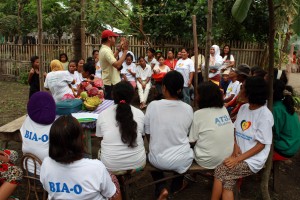GENERAL SANTOS, Philippines – In a small and disadvantaged village in this city, residents have been meeting monthly not just for a single reason.
Theresita Cordoba, 49, a mother to eight children and a parent leader, shares a different perspective on how a family development session works for them.
“It has a deeper meaning for us. Not only part of conditions set for the cash grants program,” Mrs. Cordoba explains.
In the village of San Jose, she says family development sessions have been a venue for restoring relationship among families.
“It’s like we are one family and it helps edify us,” she cites.
“There have been many instances during our sessions where broken hearted mothers and those stress have been healed. A simple fellowship where you can talk and socialise with your neighbours helps,” she adds.
Mrs. Cordoba came from a poor family. She did not able to get a degree in college due to financial reasons. Two of her children were covered by the conditional cash transfer program.
But according to her, keeping a family relationship strong and intact even they are not rich, matters most.
“What will you do with all your money if you’re a broken family? It’s only my opinion. But of course, we are working too to be able to pay our bills as well to support our children’s education,” she says.
Mrs. Cordoba’s husband, Edgar, 59, works as factory part-time driver.
Gemma N. Rivera, regional project manager for CCT, says that the FDS is one of the conditions that the beneficiaries should fulfil in order to continuously receive cash grants.
The session’s attendance reflects the performance of the parents as the program’s main receivers of the Program’s financial support.
“It’s good thing to know that there are cases like these. We don’t want a broken family within our list of clients because it loses the essence of the program,” she cites.
Under the program, a household beneficiary with up to three children receives cash grants of P1,400 per month. The cash grants are given on a monthly basis while undergoing case management and preparing them for mainstreaming to the regular CCT.
Rivera says in the late 1990s there have been CCTs globally. However, while the CCT failed in developed countries, with or without conditions, it seems to report good results in Third World countries like Philippines, Mexico, Argentina, Brazil, Turkey, Jamaica, Honduras, and Bangladesh. (End)

